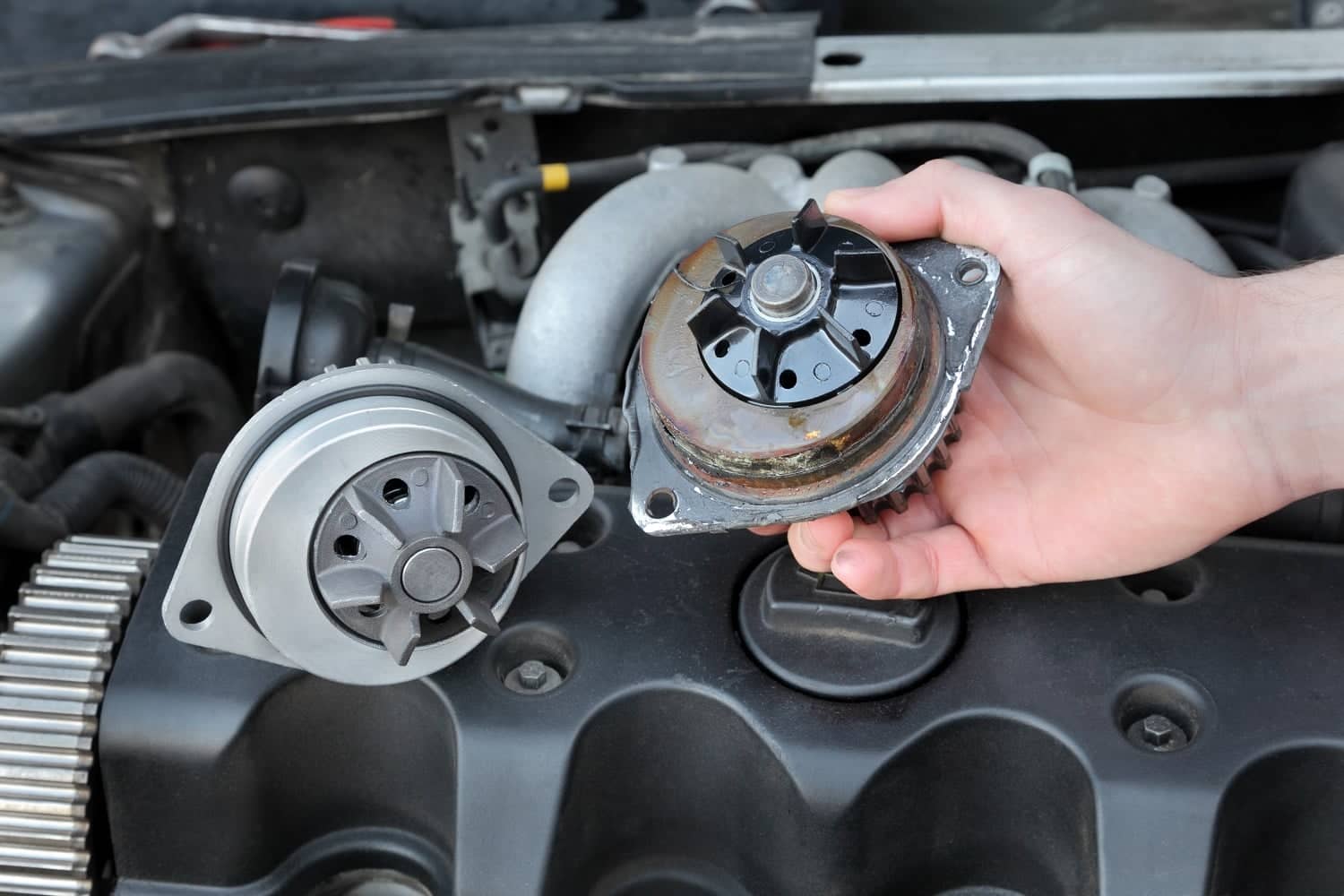Dealing with a water pump leaking coolant can be frustrating. It often leads to engine overheating and potential damage.
Understanding why a water pump leaks coolant is essential for car maintenance. The water pump plays a crucial role in your vehicle’s cooling system. It circulates coolant through the engine, preventing it from overheating. A leak can disrupt this flow, causing your engine to run hot.
This can lead to more significant issues if not addressed promptly. Recognizing the signs of a leaking water pump can save you from costly repairs. In this blog, we will explore the common causes, symptoms, and solutions for a water pump leaking coolant. Stay tuned to keep your car running smoothly and avoid unexpected breakdowns.
Common Causes
A leaking water pump can cause significant issues for your vehicle. Identifying the common causes is crucial. Knowing the reasons behind the leak can help you address the problem quickly. Below are some of the most common causes of a water pump leaking coolant.
Worn Seals
Worn seals are a primary cause of water pump leaks. These seals are designed to prevent coolant from leaking out of the pump. Over time, they can wear out or become brittle. This wear and tear lead to leaks. Regular inspection can help catch worn seals early.
Loose Connections
Loose connections can also result in a leaking water pump. The water pump is connected to various hoses and components. If these connections become loose, coolant can escape. Checking for loose connections should be part of routine maintenance. Tightening these connections can often resolve the issue.
| Cause | Description |
|---|---|
| Worn Seals | Seals that have become brittle or worn out, leading to leaks. |
| Loose Connections | Connections that are not tightly secured, allowing coolant to escape. |
Understanding these common causes can save you time and money. Addressing these issues promptly can prevent further damage to your vehicle. Regular maintenance is key to keeping your water pump in good working condition.

Credit: www.reddit.com
Symptoms Of A Leak
Water pump leaks can cause serious engine problems. Identifying the symptoms early helps prevent further damage. Knowing what to look for makes it easier to catch leaks before they worsen.
Coolant Puddles
One of the most obvious symptoms is coolant puddles. Check under your car after it’s been parked for a while. If you see green, orange, or pink liquid, you likely have a leak. This liquid is coolant and should not be on the ground. A leaking water pump often causes these puddles.
Engine Overheating
Another symptom is engine overheating. The water pump circulates coolant to keep the engine cool. If it leaks, the engine may overheat. Keep an eye on the temperature gauge. If it rises above normal, this could be a sign of a leak. Overheating can lead to serious engine damage.
Immediate Actions
A leaking water pump can be a serious issue for your vehicle. Taking immediate actions can prevent further damage. Here are some steps to follow right away.
Check Coolant Level
First, check the coolant level in your radiator. Low coolant can cause engine overheating. Open the hood and locate the radiator cap. Remove it carefully to avoid burns. Look inside to see the coolant level. If it’s low, top it up with the recommended type of coolant. Always check the manual for the correct type.
Inspect Water Pump
Next, inspect the water pump for signs of leaks. Look for puddles or damp spots under the engine. Check around the water pump housing for any wetness. A damaged pump may show visible cracks or corrosion. Listen for unusual noises from the pump area. Grinding or whining sounds can indicate pump failure. If you notice any of these signs, it’s time to consult a mechanic.
Temporary Fixes
Dealing with a water pump leaking coolant can be stressful. You might not always have the resources or time for a permanent fix. Temporary fixes can give you some breathing room. They help you manage the issue until you can get professional help.
Coolant Leak Sealant
One quick solution is using a coolant leak sealant. These products work by sealing small leaks. They are easy to use. Pour the sealant into the radiator. It circulates with the coolant. The sealant finds and seals the leaks. It is a temporary fix. It may not work for larger leaks.
Tighten Clamps
Loose clamps can cause coolant leaks. Tightening them can stop the leak. Use a screwdriver or wrench. Check the clamps around the hoses. Tighten any that feel loose. This simple action can make a big difference. It is easy and doesn’t take much time.
Permanent Solutions
Experiencing a water pump leaking coolant can be frustrating. Finding permanent solutions ensures your vehicle runs smoothly and prevents further damage. Below are some effective methods to fix this issue.
Replace Water Pump
Sometimes, the best solution is to replace the water pump entirely. A failing water pump can lead to serious engine problems. Follow these steps:
- Drain the coolant from the radiator.
- Remove any components blocking access to the water pump.
- Unbolt and remove the old water pump.
- Clean the mounting surface thoroughly.
- Install the new water pump and secure it with bolts.
- Refill the radiator with coolant.
Replacing the water pump ensures no further leaks and improves your engine’s performance.
Install New Gasket
A damaged gasket can cause coolant leaks. Installing a new gasket can be a permanent fix. Here are the steps:
- Drain the coolant from the radiator.
- Remove the water pump.
- Carefully remove the old gasket material from the mounting surface.
- Apply a new gasket to the water pump.
- Reinstall the water pump with the new gasket in place.
- Refill the radiator with coolant.
Installing a new gasket ensures a tight seal, preventing further leaks.

Credit: www.reddit.com
Maintenance Tips
Maintaining your water pump is essential to prevent coolant leaks. Regular maintenance can save you from costly repairs and keep your vehicle running smoothly. Below are some key tips to help you keep your water pump in top condition.
Regular Inspections
Regular inspections are crucial to detect early signs of wear and tear. Check the pump for any visible leaks or corrosion. Look at the ground under your vehicle for any coolant puddles. These are common indicators of a leaking water pump.
Examine the water pump housing and gasket area. These are common spots for leaks. Inspect the belts and hoses connected to the pump. They should be tight and show no signs of wear. Loose or worn belts can cause the pump to malfunction.
| Inspection Area | Signs to Look For |
|---|---|
| Pump Housing | Leaks, Corrosion |
| Belts and Hoses | Wear, Looseness |
| Ground Under Vehicle | Coolant Puddles |
Timely Replacements
Replacing the water pump at the right time is essential. A worn-out pump can cause engine overheating. Refer to your vehicle’s manual for the recommended replacement interval. Most manufacturers suggest replacing the pump every 60,000 to 90,000 miles.
If you notice any signs of a leaking pump, replace it immediately. Delaying replacement can lead to more severe engine damage. Always use high-quality replacement parts. Poor-quality parts can fail quickly and cause further issues.
- Check the vehicle manual for replacement intervals.
- Replace the pump immediately if you notice leaks.
- Use high-quality replacement parts.
Following these maintenance tips can help you avoid coolant leaks and keep your vehicle running efficiently. Regular inspections and timely replacements are the keys to a healthy water pump.
Preventive Measures
Experiencing a water pump leaking coolant can be a major headache. Taking preventive measures can save you from costly repairs. In this section, we will discuss some effective steps to prevent coolant leaks from your water pump.
Use Quality Coolant
Always use coolant that meets your vehicle’s specifications. Quality coolant can prevent corrosion and buildup. Cheap coolant often contains harmful chemicals. These can damage the water pump and other components.
Mix the coolant with distilled water. This prevents mineral deposits from tap water. Regularly check the coolant level. Top it up as needed with the correct mixture.
Monitor Temperature Gauge
Keep an eye on your vehicle’s temperature gauge. It can alert you to overheating issues. An overheating engine can damage the water pump. If you notice the gauge rising, stop the vehicle immediately. Let the engine cool down.
Check for any visible coolant leaks. Address any issues before they get worse. Regular maintenance checks can help identify problems early. Ensure the cooling system is in good condition. This includes the radiator, hoses, and thermostat.

Credit: gobdp.com
Professional Help
Dealing with a water pump leaking coolant can be daunting. Sometimes, the best option is to seek professional help. Trained mechanics can diagnose and fix the issue swiftly. They have the tools and expertise to handle complex problems. Let’s explore when to consult a mechanic and the cost considerations involved.
When To Consult A Mechanic
If you notice coolant pooling under your car, seek professional help. A mechanic can determine if the water pump is the culprit. Unusual noises from the engine may also signal a problem. Ignoring these signs can lead to severe engine damage. Don’t wait for the problem to worsen.
Check for overheating issues. If the temperature gauge rises quickly, it’s time to consult a mechanic. Loss of coolant can lead to engine overheating. This can cause irreversible damage. A professional can fix the leak and prevent further issues.
Cost Considerations
Repair costs can vary. The price depends on the make and model of your vehicle. Labor costs also play a role. Replacing a water pump can be expensive. Expect to pay between $300 and $750. This includes parts and labor.
Regular maintenance can save money in the long run. Addressing a leak early can prevent larger, costlier repairs. Be proactive. Consult a mechanic at the first sign of trouble. Investing in professional help can save you time and money.
Frequently Asked Questions
What Causes A Water Pump To Leak Coolant?
A damaged seal or a worn-out gasket often causes a water pump to leak coolant.
How Can I Identify A Leaking Water Pump?
Look for coolant puddles under your car and check for overheating issues.
Is It Safe To Drive With A Leaking Water Pump?
No, driving with a leaking water pump can lead to engine overheating and severe damage.
How Do I Fix A Leaking Water Pump?
Replacing the water pump is usually the best solution. Consult a mechanic for proper installation.
How Much Does It Cost To Replace A Water Pump?
The cost varies, but typically ranges from $300 to $750, including labor and parts.
Conclusion
A leaking water pump can cause serious engine issues. Regular maintenance helps prevent costly repairs. Check for coolant leaks often. Replace the water pump if necessary. This ensures your vehicle runs smoothly. Addressing problems early saves money and stress. Keep your car in top shape.
Always stay vigilant about your car’s health. Simple checks go a long way. Taking care of your vehicle is essential. Stay proactive and enjoy a reliable ride.

















